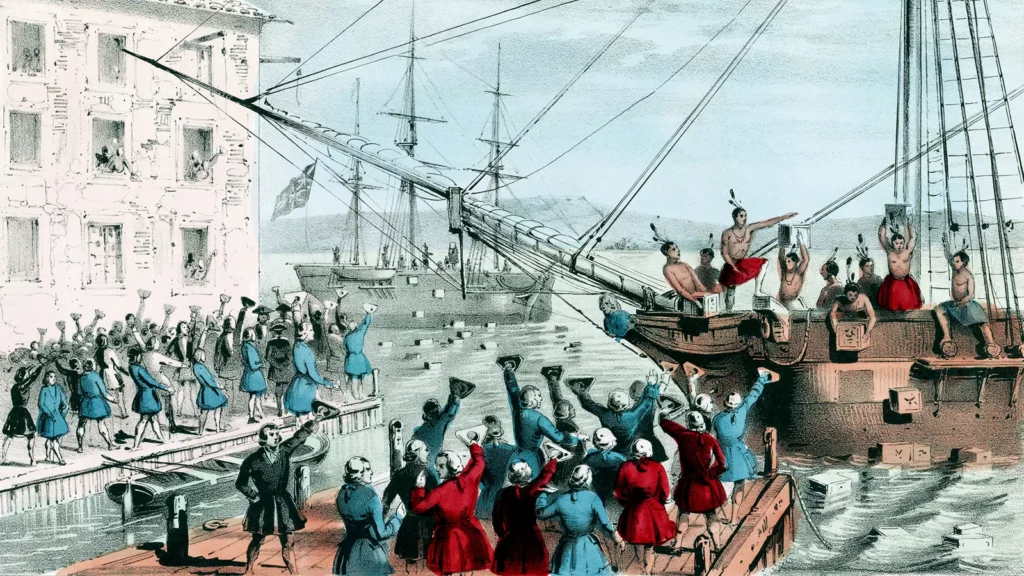Tea has been many things in its time – a global commodity, a comforting beverage, and even, in the eyes of some Bostonians 250 years ago this week, a symbol of oppressive politics. But one role you might not have attributed to tea is that of a life-saving health intervention.
In a recent paper in the Review of Statistics and Economics, economist Francisca Antman of the University of Colorado, Boulder, makes a convincing case that the explosion of tea as an everyman's drink in late 1700s England saved many lives. This would not have been because of any antioxidants or other substances inherent to the lauded leaf.
Instead, the simple practice of boiling water for tea, in an era before people understood that illness could be caused by water-borne pathogens, may have been enough to keep many from an early grave.
English demographics from this era have long contained a puzzle for historians. Between 1761 and 1834, the annual death rate declined substantially, from 28 to 25 per 1,000 people. But at the same time, wages do not seem to have risen much and standards of living arguably did not increase. In fact, with the rise of the industrial revolution, more and more people were crowding into towns whose sanitation left much to be desired. "I would say it's not a settled debate," says Antman.
The idea that tea might be the missing link here, thanks to the need to boil water for a proper brew, had been floated by historians in the past. Boiling water kills bacteria that cause diarrheal diseases like dysentery, which was often called "flux" or "bloody flux" in death records.

"With people coming into cities to work, you would expect, given the level of sanitation they have, that the big killer is water," says Antman. But it remained a somewhat fuzzy idea, interesting in theory but difficult to prove.
Antman developed a way to test it, using detailed geographical information about more than 400 parishes across England. There is a simple assumption at the heart of her study: more water sources in an area likely means cleaner water. If one source was contaminated, the inhabitants of a parish could go to another. What's more, if people were closer to the sources of rivers – something Antman infers from parishes' elevation – that water was likely safer than in parishes further downstream.
By assigning parishes an inferred level of water quality, Antman could see whether areas with worse water quality saw a bigger decline in mortality than those with good water.
In terms of testing this hypothesis, the key date is 1785, the moment when tea suddenly became affordable for the vast majority of Britons. There were many things already to recommend tea as a drink of the masses: you could make a satisfying brew with just a small amount of leaves, the leaves could be reused for multiple pots, and tea was potentially cheaper than beer, which was rendered expensive both by the complex process required to make it and by a tax on malt.
But when 1784's Tea and Windows Act went into effect, the tax on tea went from 119% to just 12.5% and tea consumption exploded. By the end of the 18th Century, even very poor peasants were having tea twice a day, tea historian Alan Macfarlane writes.

To see if this change correlated with decreased mortality, Antman compared death rates before and after this watershed moment. For this she drew on the remarkable work of demographers E A Wrigley and R S Schofield, who in the mid-20th Century collected parish records from all over England spanning 1541 to 1871, including deaths.
As expected, Antman found that death rates declined in both parishes with good water and those with bad – but there was a significant difference in the size of the decline. Parishes with bad water saw death rates drop 18% more than those with good water.
What's more, she looked to see whether deaths in London from waterborne diseases like "bloody flux", and deaths from airborne pathogens like tuberculosis, or "consumption", were linked to levels of tea imports. Indeed, flux deaths declined when tea imports went up, while TB deaths remained about the time.
She also checked to see whether deaths in children – not known, in this age or any other, for being major consumers of tea – changed in London with tea imports, and found that there did not seem to be a decline in deaths of those ages two to five.
Interestingly, there was a slight decline in infant deaths, perhaps reflecting the fact that if tea-drinking parents had less diarrheal disease, their very young children might have been protected a bit as well – though Antman points out there is no way to know for sure.
For Antman, who primarily works on issues related to developing nations, this natural experiment in England all those years ago reflects a fundamental truth: sometimes people's existing behaviours can make more of a difference to their health than an explicit intervention might.
Building more privies, developing better plumbing and sewage systems, and teaching people to keep drinking water and wastewater scrupulously separate all might have extended people's lives, had such interventions been widely understood and available.
But with relatively little change to their habits, merely an increase in a behavior they already enjoyed, people seem to have protected themselves. All part of the pleasure of a simple cup of tea.
Latest Stories
-
GoldBod extends deadline for new licence regime
2 minutes -
Fiscal discipline, cedi stability to support sustained decline in inflation – Deloitte
5 minutes -
A new era of golf in Ghana: Johnnie Walker’s Annual Championship inspires next generation
10 minutes -
Hajia 4Reall to be released today after serving one-year jail term in US
19 minutes -
Private company ‘seizes’ million-euro piggery project
25 minutes -
One feared dead, 3 security personnel injured in violent clashes with ‘Ghetto Boys’ at Gomoa Dominase
34 minutes -
GPL 2024/25: We are going all out for the title – Nations FC’s Kennedy Ansah
37 minutes -
Minority credits Akufo-Addo/Bawumia gov’t for Cedi stability, questions NDC’s economic innovations
43 minutes -
Ghanaian youngster Mohammed Sofo scores in New York Red Bulls penalties win over FC Dallas
52 minutes -
Minority demands transparency as reserve figures spark concern
54 minutes -
Mahmaa has vindicated the NPP on Cedi appreciation – Amin Adam
59 minutes -
Osman Bukaris stars as Austin FC beat Houston Dynamo in US Open Cup
1 hour -
Aflao: Police probe alleged manhood shrinkage
1 hour -
Former King Faisal striker Kwame Peprah likely to leave Kerala Blasters
2 hours -
Interior Minister raises alarm over surge in unregistered weapons
2 hours

